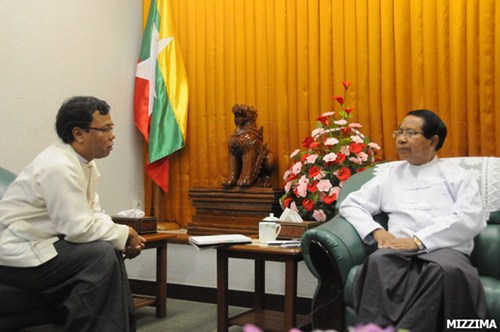Burma is undergoing “a three-step” media reform process, the minister of information told a conference on “Media Development in Myanmar” on Monday, organized by the ministry and UNESCO.

Minister of Information and Culture Kyaw Hsan said the two-day conference is a result of “media reforms taking place since 2008, the year which saw the reform of the Constitution through a referendum.”
He said the ministry has been implementing a three-step media reform process, and, in the first step, “We have been relaxing restrictions on the press phase by phase. In this step, we are paving the way for domestic periodicals to practice press freedom with responsibility and accountability.”
He called this step “a learning period in order to work in harmony with the future print media law.”
“Because of these reforms today, 173 journals and 124 magazines can now publish without prior approval from the Press Scrutiny and Registration Department,” he said. “In the second step, we are dealing with a new print media law that ensures press freedom in accord with the Constitution and replacing the existing Registration of Printers and Publishers Law (1962). In this process, the Myanmar government has been cooperating with regional media organizations since 2008. We are currently in the process of drafting the new media law, and [will] include the outcome from this conference in the second draft.”
In the third stage, he said, the Ministry of Information will support the private media sector “for [the] harmonious exercise [of] freedom and accountability under the new print media law.”
The minister noted that President Thein Sein, in an address to the Parliament in March 2011, said that “new laws should not be an obstacle to the fundamental rights of citizens. Accordingly, we are not drafting the new media law with the intention of banning or hampering press freedom. Our aim is to facilitate the proper use of press freedom for the long-term progress of Myanmar’s media sector.”
He said, “Some people have expressed concern over the government’s right to supervise, claiming it contravenes Article 19 of the Universal Declaration of Human Rights. But our goal is the emergence of current media reforms [and the] the emergence of a genuine fourth estate in a democratic society.” He said he believed that Burma’s media sector would have more transparency and freedom in the future.
However, with transparency come challenges, he said, including the observance of journalism ethics, survival in a highly competitive media industry, adaptation to advancing technology and capacity building in print and broadcast media. International cooperation and assistance is very important in the process, he said.
During the media conference, speakers and experts will share international best practices in media development with local media workers, policy makers and civil society, looking at alternatives and options for media development in the country. Issues to be addressed include laws and ethics of media practices, media empowering communities, the role of media in peace building and national reconciliation, sustainable business models for media and journalists’ professionalization. High ministry officials will also serve on various panels as moderators.
Soe Myint, the founder and managing director of Mizzima Media, will speak on “Collective responsibilities of different media stakeholders in strengthening the democratic transition” on Tuesday.
A sampling of other speakers include Kavi Chongkittavorn, chairman, Southeast Asian Press Alliance, on “The role of the media for democratization in the Asean region and in Myanmar”; Kyaw Min Swe, chief editor of The Voice journal and Living Color magazine on “The needs and challenges of the media in Myanmar’s democratic transition”; and Steve Buckley, former president, World Association of Community Radio Broadcasters on “The role of media in empowering communities.”


